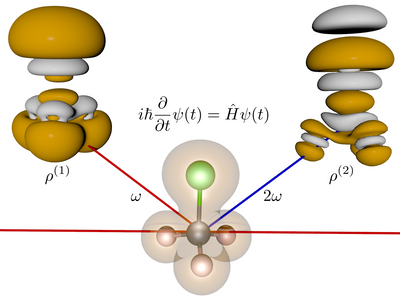The course comprises approximately 200 full-time study hours and is co-read with the course CB2070. The course elements include lectures with in-depth reading and reflective analysis that form the basis for the design and implementation of an individual project where a research problem is formulated and studied (PRO1, approximately 160 full-time study hours). Computer exercises are also included (LAB1, approximately 40 full-time study hours). A more detailed description of the course content and structure can be found in the course memo.
FCB3202 Molecular Quantum Mechanics 7.5 credits

The course provides knowledge and skills in the field of molecular quantum mechanics corresponding to the third cycle.
Information per course offering
Information for Spring 2026 Start 13 Jan 2026 programme students
- Course location
KTH Campus
- Duration
- 13 Jan 2026 - 13 Mar 2026
- Periods
Spring 2026: P3 (7.5 hp)
- Pace of study
50%
- Application code
10704
- Form of study
Normal Daytime
- Language of instruction
English
- Course memo
- Course memo is not published
- Number of places
Max: 99
- Target group
- Doctoral students
- Planned modular schedule
- [object Object]
- Schedule
- Schedule is not published
- Part of programme
- No information inserted
Contact
Course syllabus as PDF
Please note: all information from the Course syllabus is available on this page in an accessible format.
Course syllabus FCB3202 (Spring 2022–)Content and learning outcomes
Course disposition
Course contents
The course's theoretical content includes Hamiltonian operators, Pauli principle, Born-Oppenheimer approximation, electronic structure theory, wave functions, electron densities, molecular orbitals, Slater determinants, Hartree-Fock, orbital energy and Koopmans’ theorem, group theory and symmetry, spin for many-electron systems, electron correlation, potential-energy surfaces, structure optimization, transition states and reactions, normal coordinates and vibrational motion, time-dependent perturbation theory and light-matter interaction.
The practical content of the course includes computer exercises based on the course's subject focus and an individual project related to the course's theoretical foundations. The project is based on a research question and is based on selected research articles. The project has a clear goal that requires the development of a module in the programming language Python. The theoretical basis for the research question must be obtained and a project plan must be prepared before the design and implementation phase begins. Concluding numerical simulations form the basis for answering the research question.
Intended learning outcomes
After completion of the course the student shall be able to
- demonstrate in-depth knowledge and analytical ability in molecular quantum mechanics adequate for the level of educational level of the course, and critically review others- work in the field
- demonstrate good ability to explain and analyze complex concepts in molecular quantum mechanics based on relevant research literature, and in a pedagogical way communicate the knowledge in writing and orally
- be able to reflect on and describe how scientific issues in the field's research can contribute to sustainable societal development
Literature and preparations
Specific prerequisites
Eligible for studies at the third-cycle level.**
Recommended prerequisites
General course in quantum mechanics.
Literature
Examination and completion
Grading scale
Examination
- PRO1 - Project, 6.0 credits, grading scale: P, F
- LAB1 - Laboratory work, 1.5 credits, grading scale: P, F
Based on recommendation from KTH’s coordinator for disabilities, the examiner will decide how to adapt an examination for students with documented disability.
The examiner may apply another examination format when re-examining individual students.
If the course is discontinued, students may request to be examined during the following two academic years.
Grading criteria are specified in the course PM.
Other requirements for final grade
Required for final grade: 90% attendance at lectures, written critical reflection for selected scientific articles, approved written project report and completed oral project presentation (PRO1); and attendance on computer exercises and completed exercise reports (LAB1).
Examiner
Ethical approach
- All members of a group are responsible for the group's work.
- In any assessment, every student shall honestly disclose any help received and sources used.
- In an oral assessment, every student shall be able to present and answer questions about the entire assignment and solution.